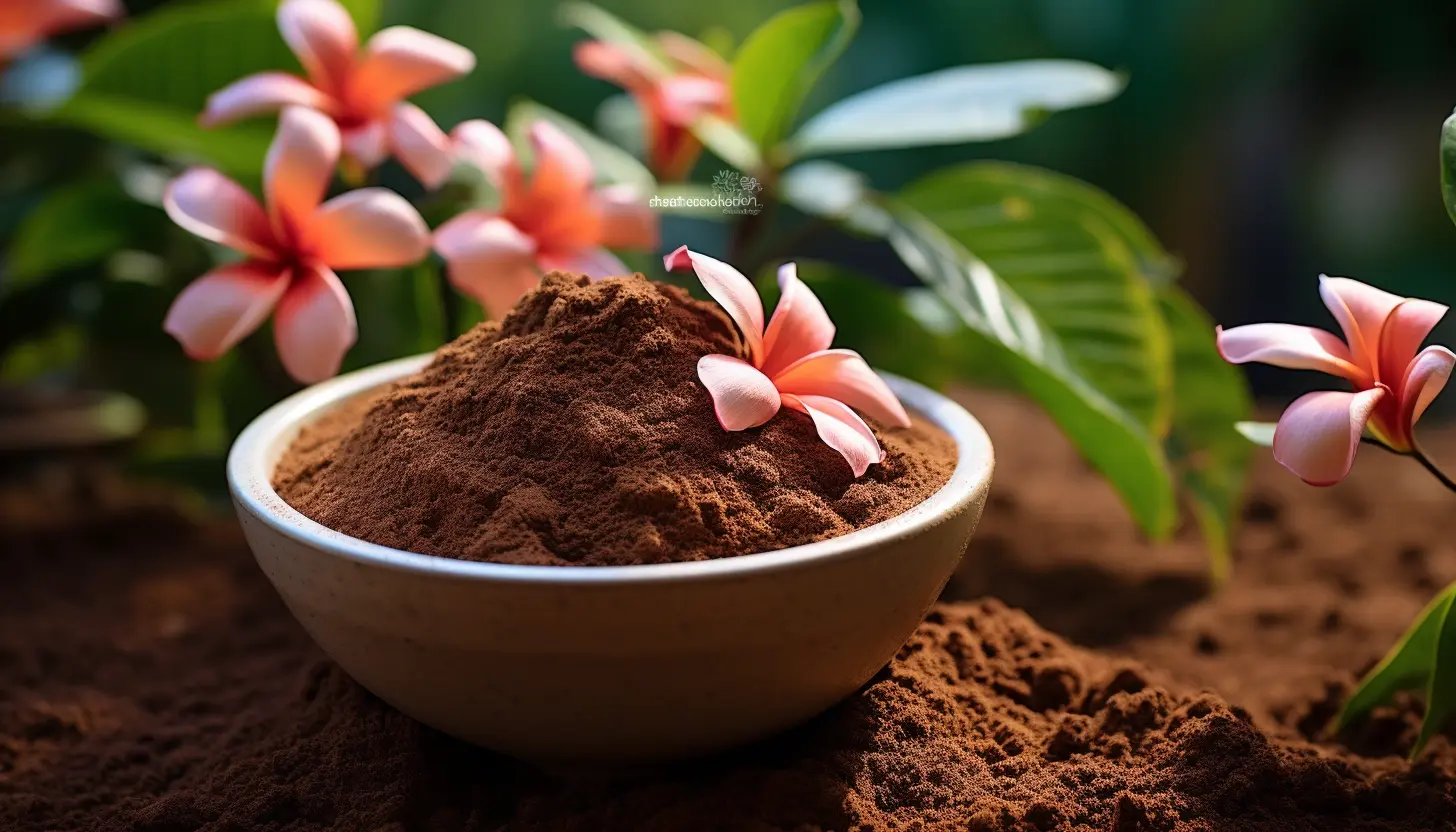Plumeria plants, with their vibrant and fragrant flowers, are a favorite among gardeners and plant enthusiasts. To ensure their optimal growth and health, it is important to provide them with the right nutrients and soil conditions. One popular topic of discussion in the gardening community is the use of coffee grounds as a soil amendment for plumeria. In this comprehensive guide, we will delve into the question: Are coffee grounds good for plumeria?
Understanding Plumeria Nutritional Needs
Before exploring the benefits of coffee grounds as a soil amendment, it is crucial to understand the nutritional needs of plumeria plants. Like any other plant, plumeria requires specific nutrients for proper growth and development. These include macronutrients such as nitrogen (N), phosphorus (P), and potassium (K), as well as micronutrients like iron (Fe), manganese (Mn), and zinc (Zn).
A deficiency in any of these nutrients can lead to stunted growth, yellowing leaves, or poor flowering. Therefore, maintaining a well-balanced nutrient profile in the soil is essential for the overall health and vitality of plumeria plants.
Coffee Grounds as a Soil Amendment for Plumeria
Coffee grounds, a byproduct of our daily caffeine fix, have gained attention for their potential benefits as a soil amendment. Rich in organic matter and containing various nutrients, coffee grounds can contribute to improving soil fertility and enhancing plant growth. However, it is important to understand the proper usage and limitations of coffee grounds when it comes to plumeria plants.
Composition and Nutritional Value of Coffee Grounds
Coffee grounds are primarily composed of organic matter, including cellulose, lignin, and nitrogen-containing compounds. They also contain significant amounts of macro and micronutrients, such as nitrogen, phosphorus, potassium, calcium, and magnesium. The exact nutrient composition of coffee grounds can vary depending on factors like the brewing method, coffee bean type, and ratio of coffee to water.
Benefits of Using Coffee Grounds for Plumeria Plants
- Improvement of Soil Structure and Drainage: Coffee grounds, when incorporated into the soil, can help improve its structure by increasing its organic matter content. This leads to better water retention and drainage, creating an ideal environment for plumeria root development.
- Enhancement of Microbial Activity and Nutrient Availability: Coffee grounds can serve as a food source for beneficial soil microbes, promoting their growth and activity. These microbes play a vital role in breaking down organic matter and releasing nutrients in a form that plants can readily absorb.
- Prevention of Nutrient Leaching: The organic matter in coffee grounds acts as a sponge, reducing the leaching of nutrients from the soil. This helps to retain essential nutrients near the root zone, ensuring that plumeria plants can access them when needed.
Precautions and Limitations of Using Coffee Grounds
While coffee grounds can offer numerous benefits, it is important to exercise caution when using them as a soil amendment for plumeria. Here are a few precautions to keep in mind:
- Acidity: Coffee grounds are slightly acidic, with a pH ranging from 6.0 to 6.8. While this acidity can be beneficial for acid-loving plants, it may not be suitable for plumeria, which prefers a slightly alkaline soil pH. Therefore, it is crucial to monitor the pH levels and adjust accordingly to prevent any negative impact on the plants.
- Quantity and Frequency: Excessive amounts of coffee grounds can lead to an imbalance in nutrient levels or excessive nitrogen, which may result in nutrient burn or hinder flower formation. It is important to apply coffee grounds in moderation and monitor the plant’s response to avoid any adverse effects.
In the next section, we will explore the proper techniques for using coffee grounds as a soil amendment for plumeria, ensuring that we maximize their benefits while avoiding potential issues.
Understanding Plumeria Nutritional Needs
Plumeria plants, like any other living organisms, have specific nutritional requirements to support their growth and overall well-being. By understanding these needs, we can ensure that our plumeria plants receive the necessary nutrients for vibrant foliage and abundant flowering.
Nutrient Requirements of Plumeria Plants
Plumeria plants require a balanced supply of macronutrients and micronutrients to thrive. Macronutrients, which are needed in larger quantities, include nitrogen (N), phosphorus (P), and potassium (K). Nitrogen is essential for leaf and stem development, phosphorus promotes root growth and flower production, while potassium aids in overall plant health and disease resistance.
In addition to macronutrients, plumeria plants also require micronutrients, albeit in smaller amounts, for various physiological processes. Micronutrients such as iron (Fe), manganese (Mn), zinc (Zn), copper (Cu), boron (B), and molybdenum (Mo) play crucial roles in enzyme activation, photosynthesis, and overall plant metabolism.
Common Deficiencies and Their Symptoms
When plumeria plants lack specific nutrients, they exhibit distinct symptoms that can help us identify and address the deficiencies. Here are some common nutrient deficiencies and their associated symptoms in plumeria plants:
- Nitrogen (N) Deficiency: Yellowing of older leaves, stunted growth, and overall pale appearance.
- Phosphorus (P) Deficiency: Reduced flower production, purplish or dark green leaves, and weak root development.
- Potassium (K) Deficiency: Yellow or brown leaf edges, weak stems, and increased susceptibility to diseases and pests.
- Iron (Fe) Deficiency: Yellowing between leaf veins, known as interveinal chlorosis, while the veins remain green.
- Manganese (Mn) Deficiency: Similar symptoms to iron deficiency, including interveinal chlorosis and reduced growth.
- Zinc (Zn) Deficiency: Stunted growth, distorted leaves, and chlorosis.
- Copper (Cu) Deficiency: Reduced flower production, wilting, and dieback of shoots.
- Boron (B) Deficiency: Distorted or malformed leaves, reduced flowering, and poor fruit development.
- Molybdenum (Mo) Deficiency: Yellowing or mottling of leaves, particularly between veins.
Role of Organic Matter in Enhancing Soil Fertility
Organic matter is a crucial component of soil fertility and plays a vital role in supporting plumeria plant growth. When organic matter, such as decomposed plant material, animal manure, or compost, is added to the soil, it provides numerous benefits:
- Improved Soil Structure: Organic matter helps to improve soil structure, making it more crumbly and well-drained. This allows roots to penetrate easily and access nutrients and water efficiently.
- Enhanced Nutrient Retention: Organic matter has a high cation exchange capacity (CEC), which means it can hold onto and release nutrients as needed by plants. This helps to prevent nutrient leaching and ensures a steady supply of nutrients for plumeria plants.
- Increased Microbial Activity: Organic matter serves as a food source for beneficial soil microbes, such as bacteria and fungi, which play a crucial role in nutrient cycling and decomposition. These microbes break down organic matter into simpler forms, releasing nutrients that are readily available to plant roots.
By understanding the nutritional needs of plumeria plants and the role of organic matter in soil fertility, we can now explore the potential benefits of using coffee grounds as a soil amendment.
Coffee Grounds as a Soil Amendment for Plumeria
Coffee grounds, a common household waste product, have gained popularity as a potential soil amendment for various plants, including plumeria. The rich organic matter content and nutrient composition of coffee grounds make them an attractive option for enhancing soil fertility. Let’s explore the benefits of using coffee grounds for plumeria plants and understand how they can contribute to their growth and overall health.
Composition and Nutritional Value of Coffee Grounds
Coffee grounds are a byproduct of the coffee brewing process and consist of the leftover coffee grounds after the liquid is extracted. These grounds are primarily composed of organic matter, including cellulose, lignin, and other complex compounds. Additionally, coffee grounds contain varying amounts of essential plant nutrients, making them a potentially valuable resource for gardeners.
The exact nutrient composition of coffee grounds can vary depending on factors such as the type of coffee bean, brewing method, and the ratio of coffee to water. Generally, coffee grounds contain significant amounts of nitrogen (N), phosphorus (P), potassium (K), calcium (Ca), and magnesium (Mg). They also provide trace amounts of micronutrients like iron (Fe), manganese (Mn), zinc (Zn), and copper (Cu).
Benefits of Using Coffee Grounds for Plumeria Plants
- Improvement of Soil Structure and Drainage: Incorporating coffee grounds into the soil can help improve its structure by increasing the organic matter content. The organic matter acts as a binding agent, creating aggregates that enhance soil porosity and water infiltration. This improved soil structure promotes root development, aeration, and efficient nutrient uptake by plumeria plants.
- Enhancement of Microbial Activity and Nutrient Availability: Coffee grounds serve as a food source for beneficial soil microorganisms, including bacteria and fungi. These microorganisms break down the organic matter in the coffee grounds, releasing nutrients in a form that plants can readily absorb. The increased microbial activity in the soil also contributes to the overall health of the soil ecosystem, supporting nutrient cycling and organic matter decomposition.
- Prevention of Nutrient Leaching: Coffee grounds have the ability to retain and release nutrients gradually, reducing the risk of nutrient leaching from the soil. This ensures a more sustained nutrient supply for plumeria plants, preventing nutrient deficiencies and promoting healthy growth.
It is important to note that while coffee grounds offer several benefits, they should be used judiciously to avoid potential issues or imbalances in nutrient levels. In the next section, we will explore the proper techniques for using coffee grounds as a soil amendment for plumeria, ensuring that we optimize their benefits while minimizing any potential drawbacks.
How to Use Coffee Grounds for Plumeria
Now that we understand the potential benefits of using coffee grounds as a soil amendment for plumeria, let’s explore the proper techniques for incorporating coffee grounds into the soil. By following these guidelines, we can ensure that we maximize the benefits while minimizing any potential risks associated with using coffee grounds.
Collecting and Preparing Coffee Grounds
To start, collect coffee grounds from your daily coffee brewing routine. You can save the used coffee grounds by allowing them to dry out completely or by storing them in an airtight container until you have accumulated enough for your plumeria plants. It is important to note that fresh coffee grounds may be more acidic, so allowing them to dry out can help reduce their acidity over time.
Incorporating Coffee Grounds into the Soil
There are several ways to incorporate coffee grounds into the soil for your plumeria plants. Here are two common methods:
- Mixing Coffee Grounds with Existing Soil: Start by loosening the soil around the base of your plumeria plant using a garden fork or hand trowel. Spread a thin layer of coffee grounds over the loosened soil and gently mix them in. Be cautious not to disturb the plant’s roots. Water the area thoroughly to help the coffee grounds integrate with the soil.
- Creating a Coffee Ground Mulch: Another option is to use coffee grounds as a mulch around the base of the plumeria plant. Apply a layer of coffee grounds around the plant, ensuring that it is not in direct contact with the stem. The mulch will help retain moisture, suppress weed growth, and gradually release nutrients into the soil as it decomposes.
Frequency and Quantity of Coffee Ground Application
When using coffee grounds as a soil amendment, it is important to consider the frequency and quantity of application. As with any organic matter, moderation is key. Here are a few guidelines to keep in mind:
- Consider the Needs of Plumeria Plants: Different plumeria varieties may have varying nutritional requirements. Observe the growth and health of your plants and adjust the coffee ground application accordingly. If you notice any adverse effects, such as leaf burn or stunted growth, reduce the amount of coffee grounds or discontinue usage.
- Avoid Over-application: Excessive amounts of coffee grounds can lead to an imbalance in nutrient levels or excessive nitrogen. Apply coffee grounds in moderation, aiming for a thin layer or a light sprinkling rather than a heavy application. This will help prevent nutrient burn and ensure that the coffee grounds integrate well with the soil.
By following these guidelines for using coffee grounds as a soil amendment for plumeria, you can provide your plants with the potential benefits while minimizing any potential risks. In the next section, we will explore additional tips and considerations for optimizing the use of coffee grounds and achieving the best results with your plumeria plants.
Additional Tips and Considerations
While coffee grounds can bring numerous benefits as a soil amendment for plumeria plants, there are additional tips and considerations to keep in mind to ensure optimal results. Let’s explore some of these factors to help you make the most out of using coffee grounds for your plumeria.
Composting Coffee Grounds for Long-term Soil Improvement
To further enhance the benefits of coffee grounds and promote long-term soil health, consider composting them before use. Composting coffee grounds with other organic materials, such as kitchen scraps or yard waste, can create a nutrient-rich compost that improves soil structure, fertility, and overall plant health. Composting also helps to reduce the acidity of coffee grounds over time, making them more suitable for plumeria plants.
Supplementing Coffee Grounds with Other Organic Amendments
While coffee grounds can provide valuable organic matter and nutrients, it is beneficial to supplement them with other organic amendments to create a well-balanced soil environment for plumeria plants. Consider incorporating compost, well-rotted manure, or other organic matter into the soil alongside coffee grounds. These additional amendments can further improve soil structure, nutrient availability, and microbial activity.
Observing Plant Response and Adjusting Coffee Ground Usage
As with any gardening practice, it is important to observe the response of your plumeria plants to the use of coffee grounds. Monitor the growth, foliage color, and flower production of your plants. If you notice any negative effects, such as leaf discoloration or stunted growth, it may indicate that the coffee grounds are not suitable for your specific plumeria variety or soil conditions. In such cases, adjust the amount or frequency of coffee ground application, or consider alternative soil amendments.
Common Misconceptions and Myths about Coffee Grounds and Plumeria
There are several misconceptions and myths surrounding the use of coffee grounds for plumeria plants. Let’s debunk a few of these to ensure accurate information:
- Coffee grounds alone are not a complete fertilizer: While coffee grounds offer some nutrients, they should not be considered a complete fertilizer. They serve as an organic amendment that contributes to soil health and nutrient availability but should be used in conjunction with other fertilizers or compost to provide a well-rounded nutrient profile for plumeria plants.
- Coffee grounds do not change flower color: There is a popular belief that using coffee grounds can change the flower color of plumeria plants. However, flower color is determined by genetics and not influenced by coffee grounds or any other soil amendment.
- Coffee grounds do not repel pests: Some gardeners believe that coffee grounds can help repel pests, such as slugs or snails. While coffee grounds may create a barrier that pests find difficult to crawl over, their effectiveness in repelling pests is minimal and should not be relied upon as the sole pest control method.
By understanding these additional tips and considerations, you can optimize the use of coffee grounds as a soil amendment for plumeria plants and create an environment that promotes their growth and overall health.
Common Misconceptions and Myths about Coffee Grounds and Plumeria
When it comes to using coffee grounds as a soil amendment for plumeria plants, there are several misconceptions and myths that have circulated over time. It is important to separate fact from fiction to make informed decisions about the use of coffee grounds in your garden. Let’s address some common misconceptions and debunk the associated myths:
- Coffee grounds make the soil too acidic for plumeria: While coffee grounds are initially slightly acidic, they are not likely to significantly alter the pH of the soil. Plumeria plants generally prefer a slightly alkaline soil pH, and the acidity of coffee grounds can be balanced by incorporating them into a well-drained soil mix or composting them with other organic materials. Regular monitoring of soil pH and making adjustments as needed will ensure that the soil remains within the ideal range for plumeria growth.
- Coffee grounds attract pests and diseases: There is a misconception that coffee grounds can attract pests or promote the growth of diseases in the garden. However, coffee grounds alone do not possess any inherent characteristics that attract pests or diseases. Proper garden maintenance practices, such as good sanitation, regular pest monitoring, and proper watering techniques, are more effective in preventing pest and disease issues.
- Coffee grounds can be used as a substitute for fertilizer: While coffee grounds contain some nutrients, they should not be considered a complete substitute for balanced fertilizers. Plumeria plants have specific nutrient requirements, and relying solely on coffee grounds may result in nutrient imbalances or deficiencies. It is important to supplement coffee grounds with other organic amendments or fertilizers to provide a well-rounded nutrient profile for plumeria plants.
- Coffee grounds change the flower color of plumeria: There is a popular belief that using coffee grounds can alter the flower color of plumeria plants. However, flower color in plumeria is genetically determined and not influenced by coffee grounds or any other soil amendment. The flower color of plumeria plants is determined by the specific cultivar or variety, not by the soil conditions.
By dispelling these misconceptions and understanding the true benefits and limitations of using coffee grounds as a soil amendment for plumeria, you can make informed decisions and maximize the potential of your plumeria garden.
Now that we have addressed the common misconceptions, let’s move on to the concluding section of this comprehensive guide on using coffee grounds for plumeria plants.
Final Thoughts on the Potential of Coffee Grounds as a Soil Amendment for Plumeria
In this comprehensive guide, we have explored the question: Are coffee grounds good for plumeria? While coffee grounds can offer several potential benefits as a soil amendment for plumeria plants, it is important to understand their proper usage and limitations. Let’s recap the key points discussed throughout this guide:
- Plumeria plants have specific nutritional needs, requiring a balanced supply of macronutrients and micronutrients for optimal growth and flowering.
- Coffee grounds, with their organic matter content and nutrient composition, can contribute to improving soil structure, enhancing microbial activity, and preventing nutrient leaching.
- When using coffee grounds as a soil amendment, it is crucial to consider factors such as acidity, quantity, and frequency of application to avoid potential issues and nutrient imbalances.
- Supplementing coffee grounds with other organic amendments and observing plant response can help optimize their benefits and address specific nutrient requirements.
- It is important to separate common misconceptions and myths from the facts when it comes to using coffee grounds for plumeria plants.
By following the proper techniques and considering the additional tips and considerations discussed in this guide, you can effectively utilize coffee grounds as a sustainable and cost-effective soil amendment for your plumeria plants. Remember to monitor the response of your plants, make adjustments as needed, and prioritize the overall health and well-being of your garden.
Experimentation and observation are key in gardening, so feel free to explore different methods and adjust the use of coffee grounds based on the unique needs of your plumeria plants. With proper care, attention, and the right soil amendments, your plumeria garden can flourish and reward you with beautiful, fragrant blooms.
Now that we have covered all the essential aspects of using coffee grounds for plumeria, you are equipped with the knowledge to make informed decisions and nurture your plumeria plants. Happy gardening!










